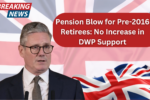Thousands of pensioners and benefit recipients across the UK are set to feel the pinch as new analysis reveals an annual reduction of approximately £459 in real-term income. This decline is not the result of direct cuts to pensions or benefits but is instead caused by a combination of frozen thresholds, rising inflation, and the withdrawal of targeted cost-of-living support payments.
For many, this may sound like just another number, but in practice, it could mean a struggle to pay for essentials like heating, food, and housing in the year ahead.
Why Is There a £459 Annual Reduction?
The figure of £459 represents the real-terms decline in pensioners’ income over the coming year when adjusted for inflation and government policy changes. The key factors contributing to this shortfall are:
1. Rising Inflation
One of the primary drivers of this income squeeze is inflation. As of late 2023, the UK’s inflation rate stood at 6.7%, after having soared to double digits in the previous year. The prices of everyday essentials food, energy bills, rent have significantly increased, eroding the spending power of fixed-income households, particularly pensioners.
While the government’s Triple Lock policy ensured that the State Pension increased by 8.5% in April 2024 in line with average earnings growth the reality is that these increases have struggled to keep up with persistent inflationary pressures.
More information about the State Pension and the Triple Lock can be found on the official GOV.UK State Pension.
2. Withdrawal of Cost of Living Payments
During the cost of living crisis, the Department for Work and Pensions (DWP) introduced Cost of Living Payments to ease financial pressure on vulnerable households. In the 2022-2023 financial year, eligible pensioners received:
- A £300 Pensioner Cost of Living Payment
- Up to £900 for low-income benefit claimants
- £150 for disabled individuals
These payments were a lifeline for many, but the government has announced that no such payments are planned beyond early 2025. This effectively removes hundreds of pounds of additional income that many pensioners and benefit recipients had come to rely on.
3. Frozen Benefit Cap
Another crucial factor is the Benefit Cap, which limits the total amount of benefits a household can receive. Despite rising living costs, the cap has remained frozen since 2016, which means that, in real terms, its value has fallen significantly due to inflation.
According to independent analysis, this freeze has resulted in an approximate 26% real-term decline in the value of benefits subject to the cap. For pensioners and low-income households who are affected, this equates to a substantial loss in spending power.

What Does This Mean for Pensioners and Benefit Claimants?
The £459 figure may not be deducted directly from your pension or benefit payments; rather, it reflects the widening gap between rising living costs and the limited increases in government support.
For an average pensioner, it may mean:
- Higher energy bills without extra financial support
- Grocery costs rising faster than pension increases
- Rent and council tax taking up a larger portion of income
For many households already on tight budgets, this could result in a growing risk of fuel poverty, food insecurity, and reliance on food banks or community support.
What Is the Government Doing?
The government has argued that it is continuing to support pensioners and benefit recipients through:
- The Triple Lock guarantee for State Pension increases
- Winter Fuel Payments, which can amount to £250 to £600 per household
- Additional benefits such as Pension Credit, designed to top up income for those on the lowest pensions
However, critics argue that these measures fail to fully address the growing gap between income and the actual cost of living.
The Winter Fuel Payment information is available here:
www.gov.uk/winter-fuel-payment
Pension Credit details can be found here:
www.gov.uk/pension-credit
How to Protect Your Income
If you’re a pensioner or benefit recipient, there are steps you can take to cushion the impact:
1. Check Your Entitlements
Many older people are not aware they may qualify for Pension Credit, Council Tax Reduction, or other local support schemes.
You can check your eligibility here: www.gov.uk/benefits-calculators
2. Apply for Energy Support Schemes
Energy providers and local councils often offer discretionary grants, insulation schemes, or reduced tariffs for pensioners. You can find more information on the government’s Help for Households website: helpforhouseholds.campaign.gov.uk
3. Seek Advice
Charities like Age UK, Citizens Advice, and local councils offer free, confidential advice to help you navigate these changes and access additional support.
- Age UK Advice Line: 0800 678 1602
- Citizens Advice: www.citizensadvice.org.uk
Conclusion
The projected £459 annual reduction may sound technical, but for real people, it will mean making tough choices about heating, eating, or paying the rent. As inflation continues to bite and temporary support measures are withdrawn, the challenge of living on a fixed income in the UK has never been greater.
Staying informed and proactive is essential. Check what help is available to you, claim everything you are entitled to, and don’t hesitate to seek advice from trusted organizations.

Pankaj Kumar is a journalist at Chandigarh X, covering admit cards, recruitment, and government schemes. His articles provide readers with detailed insights into application processes, eligibility, and exam updates.
Outside of work, Pankaj enjoys traveling, fitness, and cricket, often participating in local matches on weekends.



